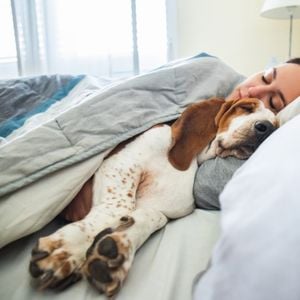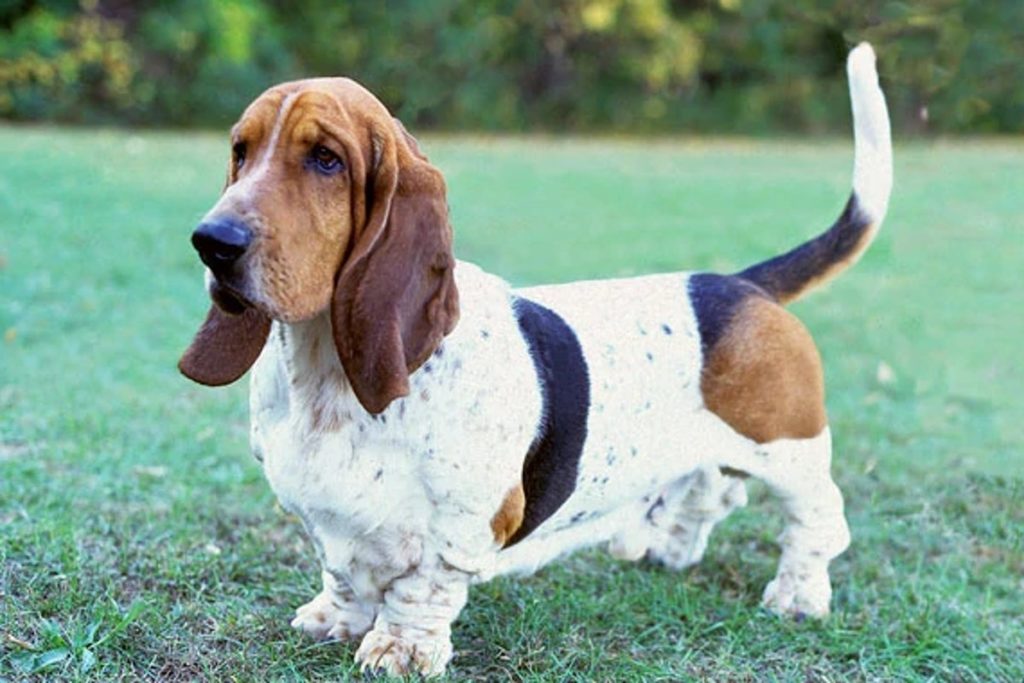One of the world’s most recognizable dog breeds, Basset hounds are known for their long bodies, floppy ears, and easy-going demeanor. Originally bred as scent hounds, these dogs are highly social and not in need of much exercise, making them great family and small-space companions.
Table of Contents
- History
- Basset hound size and appearance
- Grooming
- Activity level
- Basset hound health
- Personality
- Training Bassets
- Bottom line on Bassets
History
The Basset hound breed originated in France, bred by monks at the St. Hubert monastery. It is believed to have descended from the St. Hubert Hound, which was a popular hunting dog during the 8th century. The Basset hound was originally bred to be a scent hound, used to hunt small game such as rabbits and hares.
In the 18th century, the Basset hound was brought to England by the Duke of Richmond and Gordon. The breed became popular with the British aristocracy, who prized its short legs, long body, and strong sense of smell, which made it an excellent choice for hunting in dense undergrowth.
The Basset hound was officially recognized as a breed by the English Kennel Club in 1887. The Basset hound’s popularity spread to the United States in the early 20th century, and the American Kennel Club recognized it as a breed in 1935. Today, the breed is a beloved family companion dog.
Basset hound size and appearance
The Basset Hound is a medium-sized, short, and long-bodied dog that is easily recognizable by its large ears and droopy eyes. These dogs are considered an achondroplastic breed, meaning their limbs are abnormally short. Their name comes from the French word “bas,” meaning “low,” which refers to its short legs, as they typically stand between 12 and 15 inches tall.
Despite their short height, they can weigh between 40 and 65 pounds. In fact, Basset hounds have more bone per pound than any other dog. Don’t be fooled by their low-slung stature: these are surprisingly hefty dogs, and most people struggle to carry a full-grown adult Basset.
These dogs have a long, deep chest and a large, domed skull. Their coat is short, smooth, and dense, coming in a variety of colors, such as red and white, black and white, and tri-color.
Grooming
Basset hounds’ short, coarse coat requires minimal grooming. A quick brushing once a week should be enough to keep the coat clean and healthy. Brushing also helps keep shedding under control, because this breed has a thick and heavy coat which tends to shed a lot. It is important to note that Basset Hounds have an oily coat, so shampooing should be done sparingly.
One of the most important grooming needs for the Basset hound is cleaning and checking their ears. As their ears are quite long and droopy, they can easily become filled with wax, dirt, and debris. It is important to check the ears regularly for any signs of infection, and to clean them with a damp cloth or cotton balls.
Activity level
Basset Hounds are not very active dogs, but they do require some exercise. Due to their short, strong legs and long, heavy body, the Basset hound is not a breed that is suitable for vigorous exercise. They love to go on leisurely walks and spend time outdoors where they can smell all the scents, but they should not be taken on long runs or hikes.
Moderate activity will meet their energy and activity needs to keep these hunting dogs healthy and prevent them from becoming overweight. Since the breed was developed to work in a pack with other dogs, Bassets enjoy canine company on their outings, and the breed can be quite playful.
Basset hound health
Basset hounds are generally healthy dogs with an average life expectancy of 10-12 years. However, there are some health concerns that pet parents and veterinarians should be aware of with this breed.
Some common health issues for Basset hounds include glaucoma, thrombopathia (a blood clotting disorder), and bloat. Responsible breeders are able to check for these and other health risks.
As previously mentioned, the breed’s long ears are prone to infection. Head shaking or scratching at the ears may indicate the need for a vet visit.
Additionally, with lots of excess, drooping skin, skin problems like irritations and infections are common for Basset hounds. Monitor the areas around their ears, neck, and underarms for any signs of irritation and take note of your Basset’s itching tendencies.
Finally, pet parents should keep in mind that Basset hounds’ spines and joints are prone to damage. Their substantial weight and long body can put strain on their back and joints. Owners can help keep their dog fit and healthy by avoiding overfeeding—since extra weight adds extra stress—and not allowing the Basset to jump into or out of cars or other heights, especially during puppyhood, when their joints are still forming.
How can ElleVet’s CBD + CBDA help Basset hounds?
ElleVet’s CBD + CBDA is proven effective in providing dogs support for itchy skin. If you are noticing excessive itching, ElleVet’s CBD + CBDA products can address this irritation and discomfort and offer skin health support, which is important for maintaining a good quality of life.
CBD + CBDA is also effective in helping short-legged, long-bodied dogs like Basset hounds find relief for joint and spine discomfort that often plagues achondroplastic breeds. ElleVet’s CBD + CBDA chews, soft gels, and oils can offer support for Bassets’ joint and spine discomfort, providing relief for mobility issues and keeping these pups active. In addressing physical discomfort, ElleVet’s CBD + CBDA can lead to improved overall well-being.
Personality

The Basset Hound is an affectionate and gentle breed that loves to spend time with their family. They are very loyal, making them an excellent companion. Originally hunting in packs, they get along with children, adults, and other pets. In fact, they’re so pack-oriented that they can suffer from loneliness.
Bassets were bred to follow a scent single-mindedly, blocking out all distractions. This has made them highly alert and independent, if sometimes reluctant to take instruction. It is common for pet parents to refer to their Basset hounds are stubborn. Bassets can be serious barkers and with their sturdy feet and nails they tend to be diggers. The hunting urge is still quite strong and if not safely confined they will go off hunting on their own.
Training Bassets
With proper training and socialization, the Basset Hound can be a well-behaved and obedient pet. They have a tendency to be stubborn, so patience and consistency are necessary when training them. The Basset Hound is an excellent watchdog and will alert their family to the presence of strangers.
Bassets were bred to hunt, so if they catch an interesting scent, they’ll follow it. The Basset hound’s powerful sense of smell is second only to the Bloodhound’s, and not just the nose doing the work. Those long ears help to stir smells up toward the nose, and the droopy skin on the face holds the smell close, for maximum olfactory impact. They should always be kept in a well-fenced area to avoid roaming.
Bottom line on Bassets
Overall, Basset hounds are wonderful family dogs who love spending time with their people and require little maintenance. Owners should provide their Bassets with plenty of opportunities to work their noses, but keep them in a secure space, as they can be prone to roam. Their long, sturdy bodies can also be prone to skin and joint issues. Fortunately, ElleVet’s CBD + CBDA can help keep these dogs comfortable and happy!









